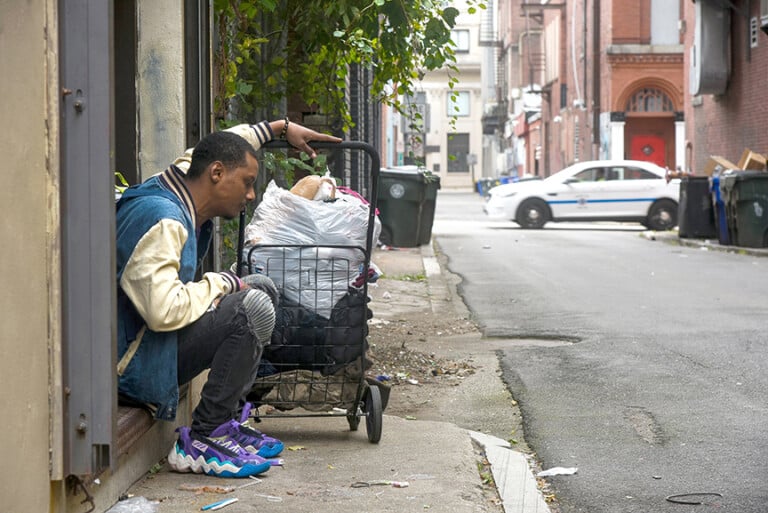Lower interest rates pushed by White House likely won’t help NH home prices
The issue here in New Hampshire remains as it has been for many months: lack of supply that forces the hand of higher prices

With an experienced alderman facing an outsider candidate for mayor of Manchester, the issue of homelessness comes down to a defense of the city’s current strategy versus a get-tough re-thinking of the city’s approach to the problem.
Manchester, the state’s largest city, has grappled with homelessness and associated problems of drug addiction, crime and eyesores through the six-year tenure of outgoing Mayor Joyce Craig.
Throughout that tenure, the city has bulldozed homeless camps, expanded shelters, encouraged rehabilitation and launched a $1.1 million city Department of Housing Stability to focus on homeless-related issues.
“We’re making progress,” said Kevin Cavanaugh, 58, an alderman of eight years and a former Democratic state senator. “I think we have a good plan in place. We’ve got to see which way the results go.”
The city has hired a homeless services director and an addiction prevention professional. And it has expanded access to services at its newest shelter, Cavanaugh said.
He is running against Jay Ruais, the top vote-getter in the September municipal primary. A one-time congressional staffer for former Republican Congressman Frank Guinta, Ruais, 38, has never held elective office.
Ruais has supported a push for a ban on camping on public property even when shelters are full. He said he did not support the creation of a 40-bed, city-operated shelter on South Beech Street last winter, and during an interview he wouldn’t commit to keeping it open.
“Everything that we do at the city level should be based on results,” Ruais said. “In the six months the Beech Street Shelter has been open, I don’t know if we’ve seen the results. I want to see the data.” He said the data should focus on how many shelter residents have improved their lives with treatment, a job or education.
In August, the city’s director of housing stability, Adrienne Beloin, released a 14-pronged mission/progress statement. The nine-page document estimated that as many as 376 homeless people live within Manchester city limits. About a third are unsheltered.
The document also estimated there are 180 homeless families, but none in an unsheltered situation.
Beloin is putting her faith in an “engagement center.” Located at the Beech Street Shelter, it will offer homeless people behavioral health interventions, peer support, medical care, housing navigation and job assistance.
Her model also calls for expanded housing opportunities, prevention and a registry of homelessness in Manchester.
She predicted that her model will reduce homelessness by 25% over three years.

A homeless couple has all their belongings with them at Veterans Memorial Park on
Elm Street in Manchester.
(Photo by
Thomas Roy)
“I think the goal should be the functional end of homelessness,” Ruais said.
He said he needs to work with Beloin before deciding whether to keep her on the job. (Beloin ran the St. Francis House homeless program in Boston before coming to Manchester.)
Ruais said he did not support making her job a department-level position, which puts the office on par with departments such as police, public works and the library. “More bureaucracy is not needed,” Ruais said.
Cavanaugh said he likes the encouragement found in Beloin’s goal.
“I’d love to see more numbers than that. I still think it’s a great goal,” he said. He also noted that the National Alliance to End Homelessness is undertaking a review of the city’s strategy and is expected to release findings in early November.
Cavanaugh questioned Ruais’ goal of a functional end to homelessness.
“You can’t cut funding for mental health services and drug treatment and think you’ll end homelessness 100%,” Cavanaugh said.
In 2008, Ruais’ former boss, then-Manchester mayor Guinta, released a 10-year plan to end homelessness. Ruais would not discuss why that plan failed, saying to do so would look backward.
During the city primary, Ruais supported a rewrite of a city ordinance that prohibits camping on public property.
The proposed rewrite, which was rejected by aldermen over concerns of its constitutionality, would have called for enforcement even when shelters are full.
Ruais said other cities have successfully enforced a no-excuse camping ban on properties near sensitive areas. Such sensitive areas include schools and kindergartens.
Encampments bring problems such as drugs, trash and crime, he said.
“I don’t think those encampments are good for anybody,” Ruais said.
Cavanaugh said he’s spoken to police, fire and mental health workers, and they’re comfortable with the no-camping ordinance as written. The current camping ban is not enforced when shelters are full.
“We have an ordinance in place we think we can enforce,” Cavanaugh said. “Just passing that (total camping ban) and thinking you can arrest your way out of this is a mistake.”